#soundtrack cover
Text
#2 in my DAI cover series this year is this funky lil guy. This one is more about the vibes than the distinct melody and I chose overtly textured/processed synths for instrumentation. I realize it might or might not be your thing and that's cool either way.
49 notes
·
View notes
Text
🏴☠️🎻
#rain posts#rain.music#pirates of the caribbean#viola da gamba#baroque music#musician#musicians on tumblr#musicians of tumblr#soundtrack cover#music cover
22 notes
·
View notes
Text
youtube
If I have to cry about this, so do all of you 😭
Huge credit to Kokkinis Sound for this! Such a beautiful cover 💜
7 notes
·
View notes
Text

The original soundtrack cover
#Soundtrack cover#Black Lagoon#BLACK LAGOON#The Lagoon company#Seinen#Rei Hiroe#Rokurou “Rock” Okajima#Rebecca “Revy” Lee#Dutch (Black Lagoon)#Benny (Black Lagoon)#Modern Pirates#Japanese character#Chinese-American Character#Caucasian-American of Jewish Religion Character#African-American character#Madhouse Studio#early 2000s
2 notes
·
View notes
Text
1 note
·
View note
Text
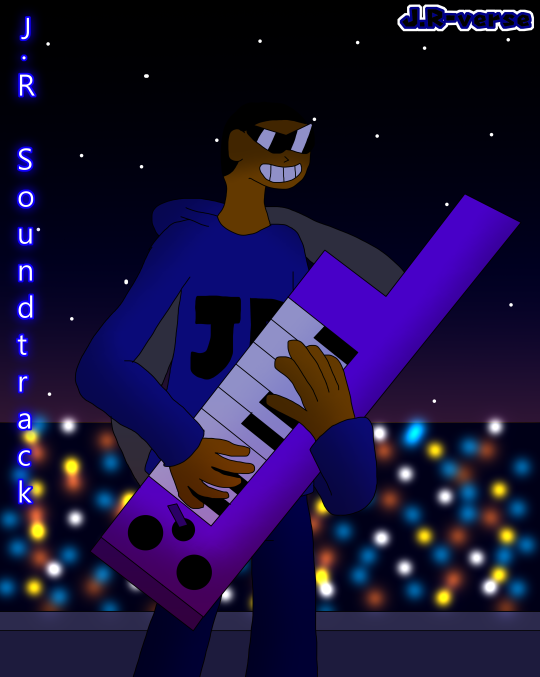
THIS... is my soundtrack cover! And there's more where that came from too.
0 notes
Text
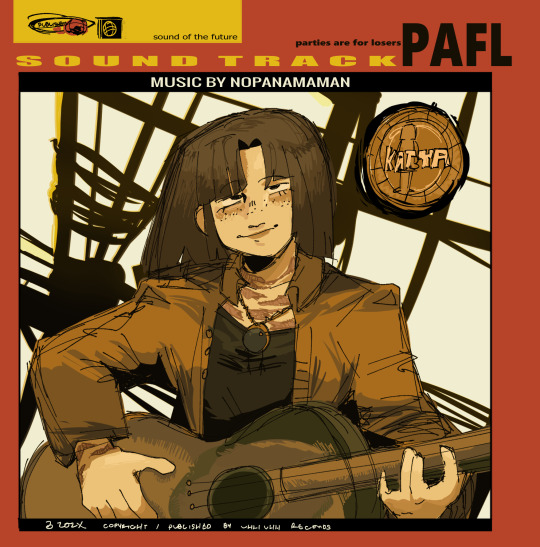
kids sergei wont let JAM OUT!!
#pafl#parties are for losers#katya#lain?? hardly know er!!#but katya does remind me of her#thanks to yuris delusional ass#all her omnipresence in songs and whatnot#also if you couldnt tell its a redraw of the lain soundtrack cover www. forgive me if its not totally accurate my ref was like 3 pixels#keep drawing instruments recently. unfortunately for me i hate it!!#i doubt katya knows how to play the guitar#unless the facility has like a rec center or something..#but you never know with goofballs#maybe she just stole it from tsar and arthur#scribbles
458 notes
·
View notes
Text
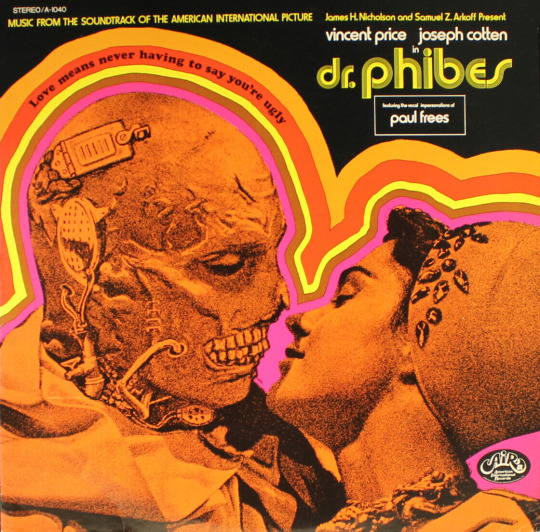
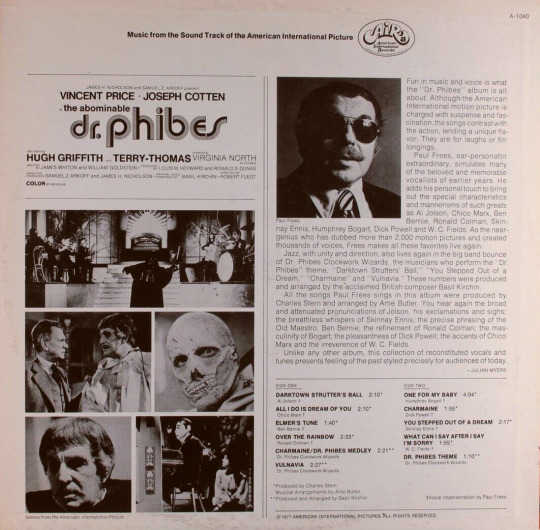
The Abominable Dr. Phibes (1971) - OST by Basil Kirchin
#the abominable dr. phibes#ost#soundtrack#basil kirchin#vincent price#virginia north#1970s horror#lp cover#dr. phibes
176 notes
·
View notes
Text
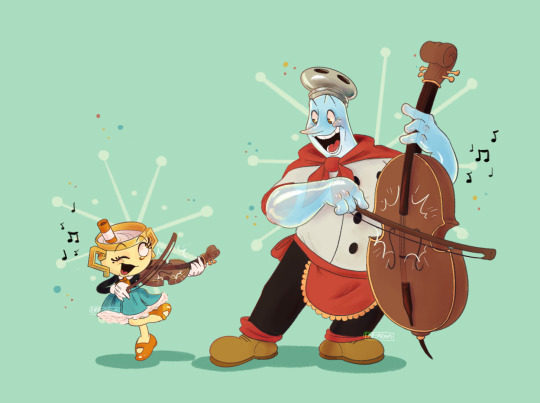
happy one year to these goobers!
#based off the dlc soundtrack’s vinyl cover art that i frequently stare at#it’s so gorgeous#cuphead#ms chalice#ms. chalice#chalice#chef saltbaker#cuphead dlc#cuphead delicious last course#cuphead fanart#character art
604 notes
·
View notes
Text





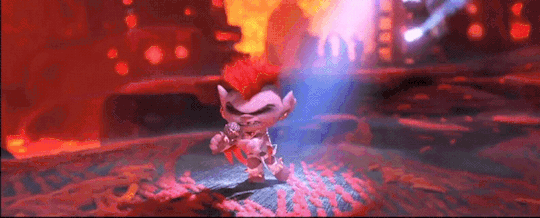
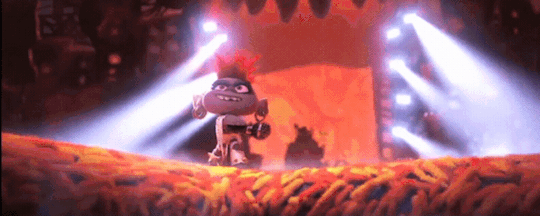

WHO WANTS TO SEE WHAT THE ULTIMATE POWER CHORD CAN DO ? ⚊𖤐
#wife my wife#hello wife can we hold hands#i made these while eating a lunchable at 9pm#if you guys dont listen to the full rachel bloom covers on the soundtrack dont even talk to me#Rachel genuinely ATE THAT#koppaitepaladin#dreamworks trolls#trolls#barb#trolls world tour#twt#trolls barb#queen barb#trolls queen barb#trolls movie#trolls gif#gifset#beeps gifs
239 notes
·
View notes
Text


Release date: January 24th, 2024
*The caption made an error regarding the release date and has been corrected by the OP under this tweet.
update: cover art in HQ ‼️
#jjk#jujutsu kaisen#gojo satoru#satoru gojo#jjk soundtrack collection#ngl the cover art is FIREEEEE#GOJO CRUMBS I'LL TAKE IT
274 notes
·
View notes
Text

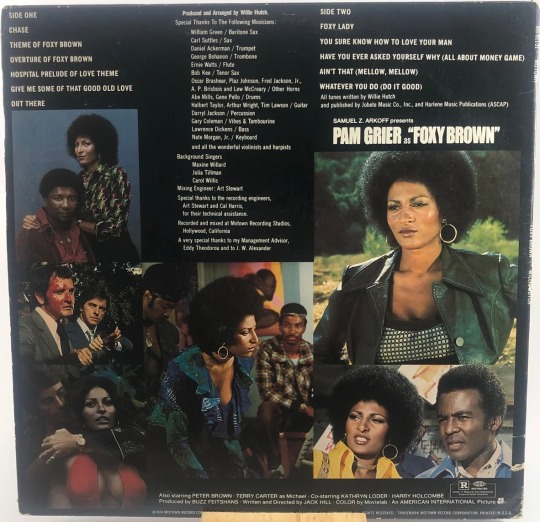
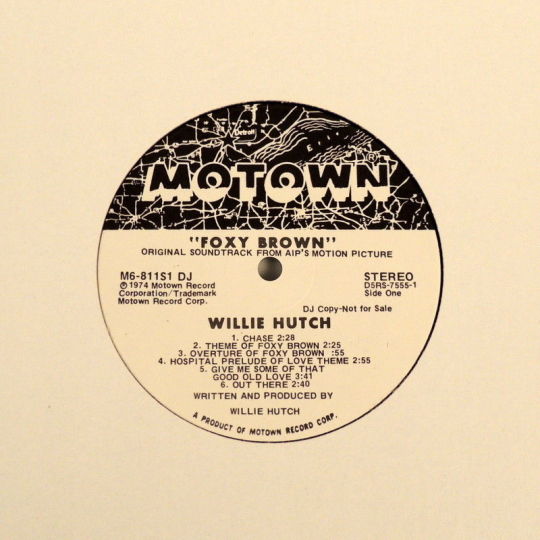

Foxy Brown soundtrack
181 notes
·
View notes
Text
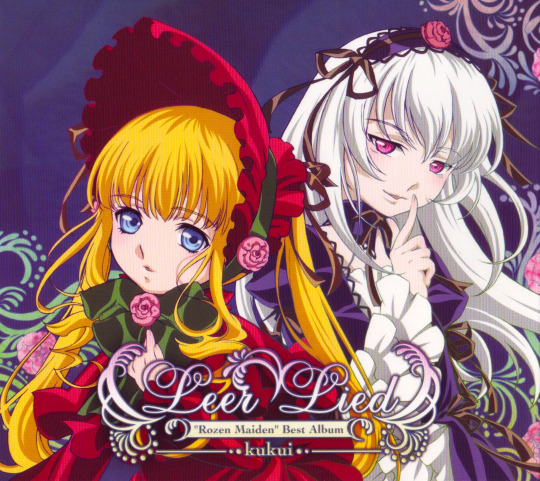

Leer Lied Rozen Maiden Best Album - Kukui (25.04.2007)
#rozen maiden#rozen maiden traumend#kukui#anime#peach pit#anime cd#anime soundtrack#anime ost#cd cover#sekaiichihappy posts
217 notes
·
View notes
Text
“It’s just a soundtrack for a first person shooter game, you don’t have to do too much”
The soundtrack:
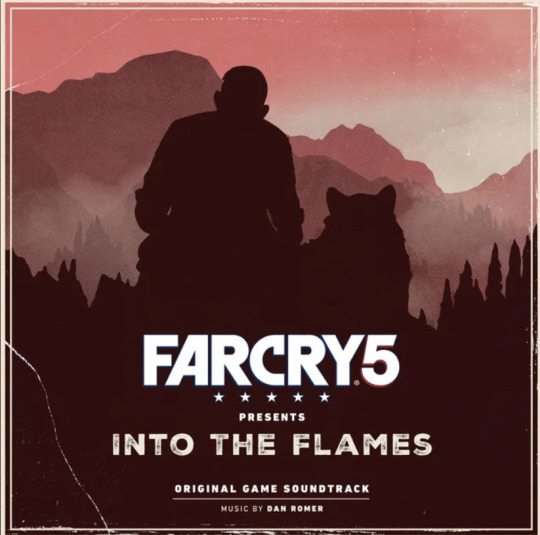
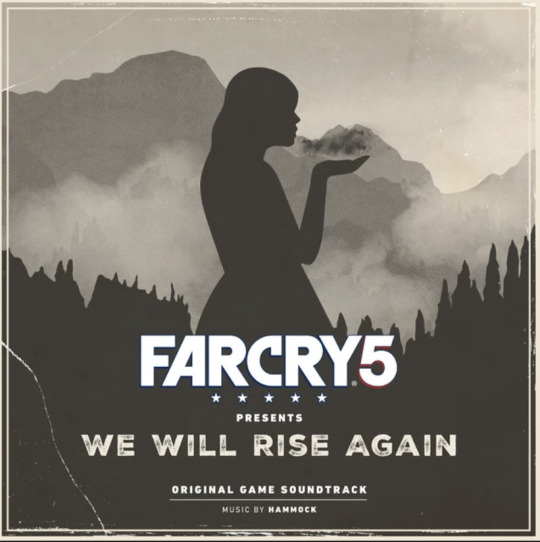
#this games soundtrack has such a special place in my heart#for context as well this is about the soundtracks as a whole these are the album covers on spotify although from a glance they look like#they are singles#far cry 5#far cry#video games#gaming#meme#faith seed#Jacob seed#John seed#Joseph seed#music
687 notes
·
View notes
Text
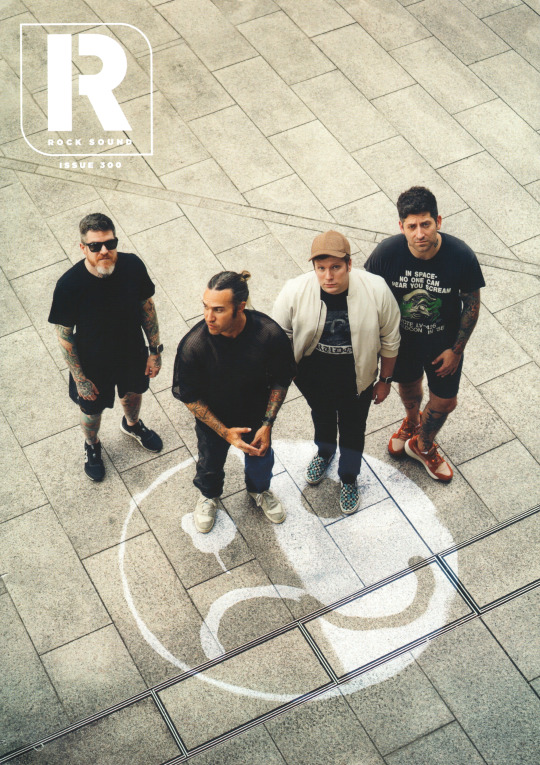


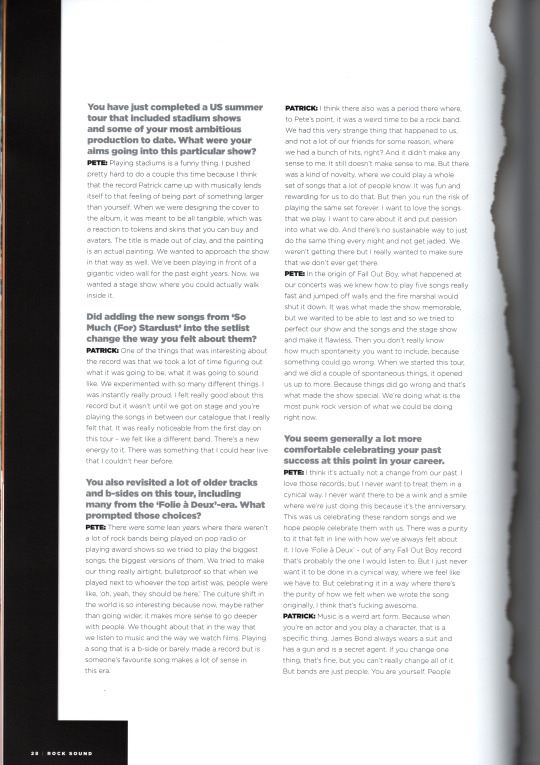



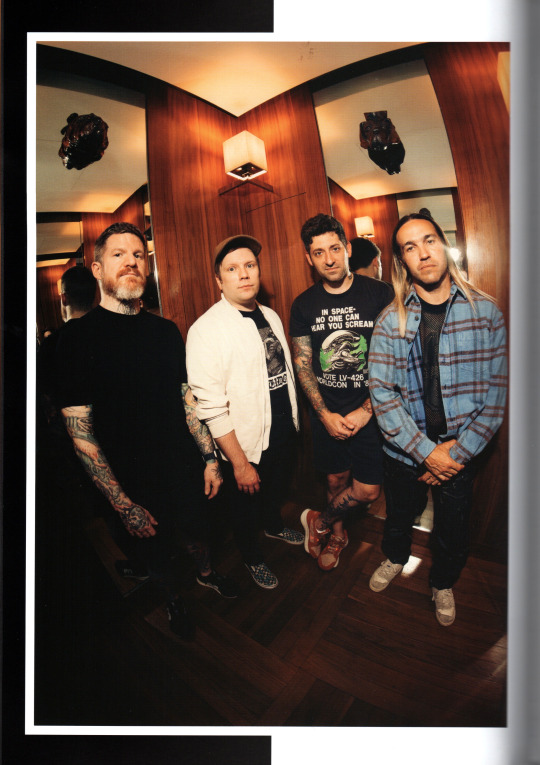
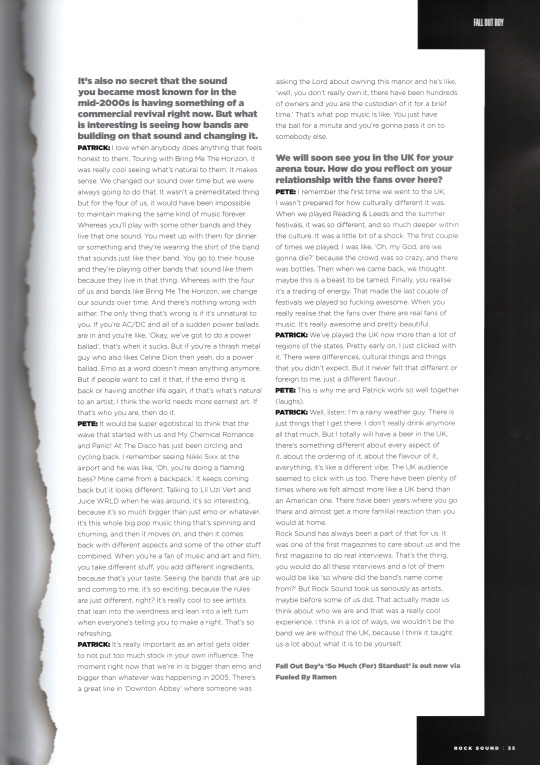
2023 september - rock sound #300 (fall out boy cover) scans
transcript below cut!
WHAT A TIME TO BE ALIVE
With the triumphant ‘So Much (For) Stardust’ capturing a whole new generation of fans, Fall Out Boy are riding high, celebrating their past while looking towards a bright future. Pete Wentz and Patrick Stump reflect on recent successes and the lessons learned from two decades of writing and performing together.
WORDS: James Wilson-Taylor
PHOTOS: Elliot Ingham
You have just completed a US summer tour that included stadium shows and some of your most ambitious production to date. What were your aims going into this particular show?
PETE: Playing stadiums is a funny thing. I pushed pretty hard to do a couple this time because I think that the record Patrick came up with musically lends itself to that feeling of being part of something larger than yourself. When we were designing the cover to the album, it was meant to be all tangible, which was a reaction to tokens and skins that you can buy and avatars. The title is made out of clay, and the painting is an actual painting. We wanted to approach the show in that way as well. We’ve been playing in front of a gigantic video wall for the past eight years. Now, we wanted a stage show where you could actually walk inside it.
Did adding the new songs from ‘So Much (For) Stardust’ into the setlist change the way you felt about them?
PATRICK: One of the things that was interesting about the record was that we took a lot of time figuring out what it was going to be, what it was going to sound like. We experimented with so many different things. I was instantly really proud. I felt really good about this record but it wasn’t until we got on stage and you’re playing the songs in between our catalogue that I really felt that. It was really noticeable from the first day on this tour - we felt like a different band. There’s a new energy to it. There was something that I could hear live that I couldn’t hear before.
You also revisited a lot of older tracks and b-sides on this tour, including many from the ‘Folie à Deux’-era. What prompted those choices?
PETE: There were some lean years where there weren’t a lot of rock bands being played on pop radio or playing award shows so we tried to play the biggest songs, the biggest versions of them. We tried to make our thing really airtight, bulletproof so that when we played next to whoever the top artist was, people were like, ‘oh yeah, they should be here.’ The culture shift in the world is so interesting because now, maybe rather than going wider, it makes more sense to go deeper with people. We thought about that in the way that we listen to music and the way we watch films. Playing a song that is a b-side or barely made a record but is someone’s favourite song makes a lot of sense in this era.
PATRICK: I think there also was a period there where, to Pete’s point, it was a weird time to be a rock band. We had this very strange thing that happened to us, and not a lot of our friends for some reason, where we had a bunch of hits, right? And it didn’t make any sense to me. It still doesn’t make sense to me. But there was a kind of novelty, where we could play a whole set of songs that a lot of people know. It was fun and rewarding for us to do that. But then you run the risk of playing the same set forever. I want to love the songs that we play. I want to care about it and put passion into what we do. And there’s no sustainable way to just do the same thing every night and not get jaded. We weren’t getting there but I really wanted to make sure that we don’t ever get there.
PETE: In the origin of Fall Out Boy, what happened at our concerts was we knew how to play five songs really fast and jumped off walls and the fire marshal would shut it down. It was what made the show memorable, but we wanted to be able to last and so we tried to perfect our show and the songs and the stage show and make it flawless. Then you don’t really know how much spontaneity you want to include, because something could go wrong. When we started this tour, and we did a couple of spontaneous things, it opened us up to more. Because things did go wrong and that’s what made the show special. We’re doing what is the most punk rock version of what we could be doing right now.
You seem generally a lot more comfortable celebrating your past success at this point in your career.
PETE: I think it’s actually not a change from our past. I love those records, but I never want to treat them in a cynical way. I never want there to be a wink and a smile where we’re just doing this because it’s the anniversary. This was us celebrating these random songs and we hope people celebrate them with us. There was a purity to it that felt in line with how we’ve always felt about it. I love ‘Folie à Deux’ - out of any Fall Out Boy record that’s probably the one I would listen to. But I just never want it to be done in a cynical way, where we feel like we have to. But celebrating it in a way where there’s the purity of how we felt when we wrote the song originally, I think that’s fucking awesome.
PATRICK: Music is a weird art form. Because when you’re an actor and you play a character, that is a specific thing. James Bond always wears a suit and has a gun and is a secret agent. If you change one thing, that’s fine, but you can’t really change all of it. But bands are just people. You are yourself. People get attached to it like it’s a story but it’s not. That was always something that I found difficult. For the story, it’s always good to say, ‘it’s the 20th anniversary, let’s go do the 20th anniversary tour’, that’s a good story thing. But it’s not always honest. We never stopped playing a lot of the songs from ‘Take This To Your Grave’, right? So why would I need to do a 20-year anniversary and perform all the songs back to back? The only reason would be because it would probably sell a lot of tickets and I don’t really ever want to be motivated by that, frankly.
One of the things that’s been amazing is that now as the band has been around for a while, we have different layers of audience. I love ‘Folie à Deux’, I do. I love that record. But I had a really personally negative experience of touring on it. So that’s what I think of when I think of that record initially. It had to be brought back to me for me to appreciate it, for me to go, ‘oh, this record is really great. I should be happy with this. I should want to play this.’ So that’s why we got into a lot of the b-sides because we realised that our perspectives on a lot of these songs were based in our feelings and experiences from when we were making them. But you can find new experiences if you play those songs. You can make new memories with them.
You alluded there to the 20th anniversary of ‘Take This To Your Grave’. Obviously you have changed and developed as a band hugely since then. But is there anything you can point to about making that debut record that has remained a part of your process since then?
PETE: We have a language, the band, and it’s definitely a language of cinema and film. That’s maintained through time. We had very disparate music tastes and influences but I think film was a place we really aligned. You could have a deep discussion because none of us were filmmakers. You could say which part was good and which part sucked and not hurt anybody’s feelings, because you weren’t going out to make a film the next day. Whereas with music, I think if we’d only had that to talk about, we would have turned out a different band.
PATRICK: ‘Take This To Your Grave’, even though it’s absolutely our first record, there’s an element of it that’s still a work in progress. It is still a band figuring itself out. Andy wasn’t even officially in the band for half of the recording, right? I wasn’t even officially the guitar player for half of the recording. We were still bumbling through it. There was something that popped up a couple times throughout that record where you got these little inklings of who the band really was. We really explored that on ‘From Under The Cork Tree’. So when we talk about what has remained the same… I didn’t want to be a singer, I didn’t know anything about singing, I wasn’t planning on that. I didn’t even plan to really be in this band for that long because Pete had a real band that really toured so I thought this was gonna be a side project. So there’s always been this element within the band where I don’t put too many expectations on things and then Pete has this really big ambition, creatively. There’s this great interplay between the two of us where I’m kind of oblivious, and I don’t know when I’m putting out a big idea and Pete has this amazing vision to find what goes where. There’s something really magical about that because I never could have done a band like this without it. We needed everybody, we needed all four of us. And I think that’s the thing that hasn’t changed - the four of us just being ourselves and trying to figure things out. Listening back to ‘Folie’ or ‘Infinity On High’ or ‘American Beauty’, I’m always amazed at how much better they are than I remember. I listened to ‘MANIA’ the other day, and I have a lot of misgivings about that record, a lot of things I’m frustrated about. But then I’m listening to it and I’m like ‘this is pretty good.’ There’s a lot of good things in there. I don’t know why, it’s kind of like you can’t see those things. It’s kind of amazing to have Pete be able to see those things. And likewise, sometimes Pete has no idea when he writes something brilliant, as a lyricist, and I have to go, ‘No, I’m gonna keep that one, I’m gonna use that.’
On ‘So Much (For) Stardust’, you teamed up with producer Neal Avron again for the first time since 2008. Given how much time has passed, did it take a minute to reestablish that connection or did you pick up where you left off?
PATRICK: It really didn’t feel like any time had passed between us and Neal. It was pretty seamless in terms of working with him. But then there was also the weird aspect where the last time we worked with him was kind of contentious. Interpersonally, the four of us were kind of fighting with each other… as much as we do anyway. We say that and then that myth gets built bigger than it was. We were always pretty cool with each other. It’s just that the least cool was making ‘Folie’. So then getting into it again for this record, it was like no time has passed as people but the four of us got on better so we had more to bring to Neal.
PETE: It’s a little bit like when you return to your parents’ house for a holiday break when you’re in college. It’s the same house but now I can drink with my parents. We’d grown up and the first times we worked with Neal, he had to do so much more boy scout leadership, ‘you guys are all gonna be okay, we’re gonna do this activity to earn this badge so you guys don’t fucking murder each other.’ This time, we probably got a different version of Neal that was even more creative, because he had to do less psychotherapy.
He went deep too. Sometimes when you’re in a session with somebody, and they’re like, ‘what are we singing about?’, I’ll just be like, ‘stuff’. He was not cool with ‘stuff’. I would get up and go into the bathroom outside the studio and look in the mirror, and think ‘what is it about? How deep are we gonna go?’ That’s a little but scarier to ask yourself. If last time Neal was like a boy scout leader, this time, it was more like a Sherpa. He was helping us get to the summit.
The title track of the album also finds you in a very reflective mood, even bringing back lyrics from ‘Love From The Other Side’. How would you describe the meaning behind that title and the song itself?
PETE: The record title has a couple of different meanings, I guess. The biggest one to me is that we basically all are former stars. That’s what we’re made of, those pieces of carbon. It still feels like the world’s gonna blow and it’s all moving too fast and the wrong things are moving too slow. That track in particular looks back at where you sometimes wish things had gone differently. But this is more from the perspective of when you’re watching a space movie, and they’re too far away and they can’t quite make it back. It doesn’t matter what they do and at some point, the astronaut accepts that. But they’re close enough that you can see the look on their face. I feel like there’s moments like that in the title track. I wish some things were different. But, as an adult going through this, you are too far away from the tether, and you’re just floating into space. It is sad and lonely but in some ways, it’s kind of freeing, because there’s other aspects of our world and my life that I love and that I want to keep shaping and changing.
PATRICK: I’ll open up Pete’s lyrics and I just start hearing things. It almost feels effortless in a lot of ways. I just read his lyrics and something starts happening in my head. The first line, ‘I’m in a winter mood, dreaming of spring now’, instantly the piano started to form to me. That was a song that I came close to not sending to the band. When I make demos, I’ll usually wait until I have five or six to send to everybody. I didn’t know if anyone was gonna like this. It’s too moody or it’s not very us. But it was pretty unanimous. Everyone liked that one. I knew this had to end the record. It took on a different life in the context of the whole album. Then on the bridge section, I knew it was going to be the lyrics from ‘Love From The Other Side’. It’s got to come back here. It’s the bookends, but I also love lyrically what it does, you know, ‘in another life, you were my babe’, going back to that kind of regret, which feels different in ‘Love From The Other Side’ than it does here. When the whole song came together, it was the statement of the record.
Aside from the album, you have released a few more recent tracks that have opened you up to a whole new audience, most notably the collaboration with Taylor Swift on ‘Electric Touch’.
PETE: Taylor is the only artist that I’ve met or interacted with in recent times who creates exactly the art of who she is, but does it on such a mass level. So that’s breathtaking to watch from the sidelines. The way fans traded friendship bracelets, I don’t know what the beginning of it was, but you felt that everywhere. We felt that, I saw that in the crowd on our tour. I don’t know Taylor well, but I think she’s doing exactly what she wants and creating exactly the art that she wants to create. And doing that, on such a level, is really awe-inspiring to watch. It makes you want to make the biggest, weirdest version of our thing and put that out there.
Then there was the cover of Billy Joel’s ‘We Didn’t Start The Fire’, which has had some big chart success for you. That must have taken you slightly by surprise.
PATRICK: It’s pretty unexpected. Pete and I were going back and forth about songs we should cover and that was an idea that I had. This is so silly but there was a song a bunch of years ago I had written called ‘Dark Horse’ and then there was a Katy Perry song called ‘Dark Horse’ and I was like, ‘damn it’, you know, I missed the boat on that one. So I thought if we don’t do this cover, somebody else is gonna do it. Let’s just get in the studio and just do it. We spent way more time on those lyrics than you would think because we really wanted to get a specific feel. It was really fun and kind of loose, we just came together in Neal’s house and recorded it in a day.
PETE: There’s irreverence to it. I thought the coolest thing was when Billy Joel got asked about it, and he was like, ‘I’m not updating it, that’s fine, go for it.’ I hope if somebody ever chose to update one of ours, we’d be like that. Let them do their thing, they’ll have that version. I thought that was so fucking cool.
It’s also no secret that the sound you became most known for in the mid-2000s is having something of a commercial revival right now. But what is interesting is seeing how bands are building on that sound and changing it.
PATRICK: I love when anybody does anything that feels honest to them. Touring with Bring Me The Horizon, it was really cool seeing what’s natural to them. It makes sense. We changed our sound over time but we were always going to do that. It wasn’t a premeditated thing but for the four of us, it would have been impossible to maintain making the same kind of music forever. Whereas you’ll play with some other bands and they live that one sound. You meet up with them for dinner or something and they’re wearing the shirt of the band that sounds just like their band. You go to their house and they’re playing other bands that sound like them because they live in that thing. Whereas with the four of us and bands like Bring Me The Horizon, we change our sounds over time. And there’s nothing wrong with either. The only thing that’s wrong is if it’s unnatural to you. If you’re AC/DC and all of a sudden power ballads are in and you’re like, ‘Okay, we’ve got to do a power ballad’, that’s when it sucks. But if you’re a thrash metal guy who likes Celine Dion then yeah, do a power ballad. Emo as a word doesn’t mean anything anymore. But if people want to call it that, if the emo thing is back or having another life again, if that’s what’s natural to an artist, I think the world needs more earnest art. If that’s who you are, then do it.
PETE: It would be super egotistical to think that the wave that started with us and My Chemical Romance and Panic! At The Disco has just been circling and cycling back. I remember seeing Nikki Sixx at the airport and he was like, ‘Oh, you’re doing a flaming bass? Mine came from a backpack.’ It keeps coming back but it looks different. Talking to Lil Uzi Vert and Juice WRLD when he was around, it’s so interesting, because it’s so much bigger than just emo or whatever. It’s this whole big pop music thing that’s spinning and churning, and then it moves on, and then it comes back with different aspects and some of the other stuff combined. When you’re a fan of music and art and film, you take different stuff, you add different ingredients, because that’s your taste. Seeing the bands that are up and coming to me, it’s so exciting, because the rules are just different, right? It’s really cool to see artists that lean into the weirdness and lean into a left turn when everyone’s telling you to make a right. That’s so refreshing.
PATRICK: It’s really important as an artist gets older to not put too much stock in your own influence. The moment right now that we’re in is bigger than emo and bigger than whatever was happening in 2005. There’s a great line in ‘Downton Abbey’ where someone was asking the Lord about owning this manor and he’s like, ‘well, you don’t really own it, there have been hundreds of owners and you are the custodian of it for a brief time.’ That’s what pop music is like. You just have the ball for a minute and you’re gonna pass it on to somebody else.
We will soon see you in the UK for your arena tour. How do you reflect on your relationship with the fans over here?
PETE: I remember the first time we went to the UK, I wasn’t prepared for how culturally different it was. When we played Reading & Leeds and the summer festivals, it was so different, and so much deeper within the culture. It was a little bit of a shock. The first couple of times we played, I was like, ‘Oh, my God, are we gonna die?’ because the crowd was so crazy, and there was bottles. Then when we came back, we thought maybe this is a beast to be tamed. Finally, you realise it’s a trading of energy. That made the last couple of festivals we played so fucking awesome. When you really realise that the fans over there are real fans of music. It’s really awesome and pretty beautiful.
PATRICK: We’ve played the UK now more than a lot of regions of the states. Pretty early on, I just clicked with it. There were differences, cultural things and things that you didn’t expect. But it never felt that different or foreign to me, just a different flavour…
PETE: This is why me and Patrick work so well together (laughs).
PATRICK: Well, listen; I’m a rainy weather guy. There is just things that I get there. I don’t really drink anymore all that much. But I totally will have a beer in the UK, there’s something different about every aspect of it, about the ordering of it, about the flavour of it, everything, it’s like a different vibe. The UK audience seemed to click with us too. There have been plenty of times where we felt almost more like a UK band than an American one. There have been years where you go there and almost get a more familial reaction than you would at home.
Rock Sound has always been a part of that for us. It was one of the first magazines to care about us and the first magazine to do real interviews. That’s the thing, you would do all these interviews and a lot of them would be like ‘so where did the band’s name come from?’ But Rock Sound took us seriously as artists, maybe before some of us did. That actually made us think about who we are and that was a really cool experience. I think in a lot of ways, we wouldn’t be the band we are without the UK, because I think it taught us a lot about what it is to be yourself.
Fall Out Boy’s ‘So Much (For) Stardust’ is out now via Fueled By Ramen.
#the cover is so funny. like theyre cute but that is genuinely bug angle. that is bugs under a rock angle. THEYRE ALREADY SHORT KINGS#fall out boy#pete wentz#patrick stump#andy hurley#joe trohman#time capsule#read the charts#ANYWAY GO HERE. GO READ HERE. BECAUSE I SPENT A LONG TIME TRANSCRIBING EVEN THO TRNASNCRIBING SUCKKSSS#i looped the spell soundtrack like 5 times and got jusmpscared by track9 every time. and then i put on smfs<3#patrick's comments about the mythologising of fob lore is so interesting#listen baby i know ur fed up and it's not ur fault but u have to understand. the story of ur band is on some genuine fanfic ass other level#the way they talk about neal avron is sooo funny#imagine being producer for this young band. and theyre brilliant but theyre also twentysomethings(derogatory)#also the way pete talks abt swift. lol. also why does he answer the q when patrick was the one in the studio lol???#ALSO also. pete being afraid of british ppl (valid and true)#and patrick pretty much taking to the uk like a duck to water (also valid and tru) is sooo funny#i rlly liked this interview i wiiiiish i got the bundle w the photobook and whatever but i was way too late :(((((((((
105 notes
·
View notes
Text
"Minkowski's been talking about Sondheim again…": Minkowski's love of musical theatre and what it reveals about her characterisation and her relationships
TL;DR: Renée Minkowski's love of musicals, while it might seem just like a mundane character detail, is used to give depth to her character because it contrasts with expectations of her from both the listening audience and the other characters. Her willingness or unwillingness to share this interest in different circumstances reveals her relationships with other characters at various points.
Since this is a long one, if you'd rather read it as a document, you can view it here: Google Doc version.
"She actually really cares about these talent shows": Episode 8 (Box 953)
In the early episodes of Season 1, Minkowski is presented (largely through Eiffel's unreliable perspective) purely as a strict no-nonsense authority figure without much emotional depth, the kind of person who only likes things that are useful, purposeful, or mandated by Command. In contrast, musical theatre is a creative pursuit that has nothing to do with the mission of the Hephaestus and is viewed by many people as fairly frivolous or silly. The gradual exploration of Minkowski's passion for musicals is one of the many ways that the show expands and challenges our understanding of her as a character.
The first indication that we get of her interest in musicals is through her entry into the infamous talent show, something that is required as part of the mission. Minkowski really cares about 'crew morale' activities in general, even when they actually have a negative effect on morale and even before she's friends with any of her crew (for example, the Christmas and Thanksgiving dinners in the earlier stage of the mission), perhaps partly because doing things in the "right way" is important to her.
But Eiffel senses that the talent shows aren't just about rules for her: "it’s bad enough when she makes us do something just because it’s military protocol, but I think that she actually really cares about these talent shows". This might be the first indication that we get of Minkowski caring deeply about anything that isn't inherently part of her role as a Commander. Moments like this are part of the gradual process of giving us insight into her character beyond the Commander archetype that she tries to embody. And yet, she only indulges her theatrical passion because something mandatory gives her permission, or an excuse, to let another part of herself out.
Of course, to satisfy the needs of a talent show, she'd only need to provide a performance of a few minutes. But Eiffel mentions "the second act of the play" - which along with Hera's comment that "Isabel isn't the biggest role in the play" - implies that Minkowski was intending to put on the whole of Pirates of Penzance as her talent show act, rather than a few of the songs or some kind of medley. (I suppose that Eiffel could be exaggerating or Minkowski might have been planning to do extracts from different parts of the play, but I prefer the interpretation in which Minkowski gets to be more ridiculous.)
Even though no one else would be willing to be in her production of Pirates of Penzance, Minkowski casts Hera as Isabel, a role with two lines and no solo singing. I found some audition notes for this play which said "The traditional staging gives [Isabel] more prominence than the solo opportunities of the part suggest, so she must be a good actress" which does make me sad in relation to Hera's inability to have a more significant role by being physically present on stage.
It’s sweet that Hera still wants to take part though. She tells Eiffel "Pirates of Penzance is a classic of 19th century comic opera", so either she’s absorbed what Minkowski has told her about the show, or she’s done her own research and formed her own opinions. I enjoy the fact that Hera is the one Hephaestus crew member who shows potential to share Minkowski's musical theatre appreciation; I like to think that this is something they could explore together post-canon.
Anyway, I'm obsessed with the idea that Minkowski was planning to play every character except one in Pirates of Penzance, a show which is designed to have 10 principal characters and a chorus of 14 men. It seems that her contribution to the talent show was supposed to be an entire two-hour two-act musical, with costumes and props, in which she would play almost all of the parts. This is very funny to me as the perhaps predictable consequence of giving an ambitious and frustrated grown-up theatre kid a position of authority and asking them to arrange a talent show. Minkowski knows that the audience will be made up of her subordinates who are theoretically obliged by the chain of command to watch and listen, so she absolutely tries to make the most of that opportunity. There's probably also a degree to which she limits other people's involvement in her musical because - as with her other endeavors - she wants the outcome to be almost entirely within her control (something that is usually pretty much impossible in as collaborative a medium as musical theatre).
Of course, Minkowski's behaviour in most of the talent show episode is affected by her being drugged by Hilbert. This creates an exaggerated situation which is the first real opportunity for Minkowski to be something other than the strict sensible authoritarian Commander and the foil to Eiffel's jokey laid-back attitude. I don't agree with ideas that being intoxicated brings out anyone's true self (especially in the absence of consent for the intoxication), but it seems pretty clear that being under the influence of whatever was in Hilbert's concoction caused Minkowski to fully commit to a level of manic enthusiasm for her musical production that might have otherwise been obscured by her professionalism. It's a particular kind of person who belts showtunes when drunk, and Minkowski is that kind of person, even if that's not how she wants to present herself. (As a sidenote, I seem to remember that they took Emma Sherr-Ziarko's script off her to help her sound more drunk. It's an excellent performance.)
Minkowski wants interval ice cream. She wants "pirate costumes" (and she'll threaten to shoot a man to get them). She wants "swashes and buckles". She wants whatever props she can get her hands on (including a real cannon). This show is important to her, even though only three other people will witness it and two of them actively don't want to be there. It’s important to her for its own sake.
Eiffel says Minkowski wants "a second pair of eyes to tell her if the prop sabre for her Major-General costume was a bit much…" While I certainly wouldn't put it past Goddard Futuristics to have a prop sabre on the station for no apparent reason, it feels more likely that she might have made it or adapted some existing item. Which suggests that maybe she was that passionate about the props even before Hilbert drugged her.
Even so, it does feel significant that Minkowski's love of musicals is only revealed in the episode in which she is drugged, exhibiting lowered inhibitions, exaggerated behaviour, and an "impaired euphoric effect". Her love of musical theatre is initially revealed through a professional structure that provides permission, and then further emphasised by a forced intoxication that exaggerates some impulses that perhaps she already had.
"Some hobbies other than making trains run on time": Episode 17 (Bach to the Future)
After Eiffel tells to find Minkowski to find something else to do while her work duties have quietened down, they have the following exchange:
EIFFEL: You must have some hobbies other than making trains run on time. Something to do with friends? Boyfriends?
MINKOWSKI: Of course I do, but, well, there aren't really a lot of opportunities for rock climbing or trail hiking in the immediate vicinity.
Even though this quote doesn't mention musicals, I've included it here for two reasons. Firstly, it's very funny to me that, even after the talent show debacle, Eiffel acts like he's never had any evidence of Minkowski's hobbies. She tried to perform a whole play almost single-handedly and it didn't occur to him that this might indicate an interest of hers outside of work. I think this reflects the fairly two-dimensional view that Eiffel has previously had of Minkowski, which her interest in musical theatre didn't fit into.
Secondly, it feels notable that Minkowski doesn't mention musical theatre here. She wants to show that she has non-work interests, but without undermining her own authoritative image. Her interest in rock climbing and trail hiking - while it may be genuine - fits with how she wants to be seen as a Commander. These are hobbies which portray her as physically capable, with a high degree of stamina and a willingness to adapt to perhaps less hospitable surroundings. Of course, Minkowski does have these traits and they serve her well on the Hephaestus. But there's not really anything particularly surprising about her expressing these interests. The surprise in this scene comes from the reveal that she has a husband, a character detail which - like her love of musicals - isn't something we'd necessarily expect from the archetype-based view of her we are initially presented with.
Her interest in rock climbing and trail hiking never come up again, because these details don't really deepen her characterisation (or at least, they aren't really used to deepen her characterisation beyond proving that she isn't entirely all-work-and-no-play). In contrast, Minkowski's love of musicals is brought up over and over because it shows another side of her that she struggles to reveal on the Hephaestus, and that allows more interesting things to be done with her characterisation.
"You wanted to write showtunes": Episode 35 (Need to Know)
Alongside the more high stakes discoveries prompted by the leak from Kepler's files, we also learn that Minkowski applied to - and was rejected from - the Tisch Graduate Musical Theater Writing Program.
Up until this point, we've only had evidence that Minkowski enjoys performing in musicals. But here we learn that Minkowski doesn't just love watching or performing in musicals - she wanted to write them too. This suggests a creative side to her that we never see her fully express.
The course
The Tisch Graduate Musical Theatre Writing Program claims to be the only course of its kind in the world and it accepts just 30 students each year. The current application process requires applicants to: upload play scripts or recordings of songs they've written; answer a large number of extended response questions about their creative process and views on musical theatre; write a 'statement of purpose' which has to talk about why they are applying and include 3 original ideas for musicals; provide a professional resume and a digital portfolio; complete an exercise of writing in response to a prompt; and undergo an interview. The process might have changed somewhat since Minkowski would have been applying (which, if it was soon after she finished college, might have been around the early 2000s) or it might be different in Wolf 359's alternate universe, but I think we can safely assume that applying to this course was a serious undertaking that required an intense amount of commitment and work.
Applying to a course like that isn't something you do half-heartedly or on a whim. You couldn't apply to this course if you hadn't done a fair amount of musical theatre writing already. (The course requires applicants to choose to apply as bookwriters, lyricists, or composers, but I'm not going to make a guess here as to which of these Minkowski went for.) The fact that Minkowski wanted to study this course suggests that she was seriously considering trying to make a career out of musical theatre writing. In Once In A Lifetime, she tells Cutter that commanding a space station has always been her dream job, but we've got evidence here that it wasn't her only dream job. There's something kind of funny and kind of sad about the idea that writing musicals was her back-up / fall-back career path. She does not like to make life easy for herself.
The revelation
This information is revealed against Minkowski's will. It's not something she wanted people to find out, and she isn't happy about them knowing:
JACOBI: "Dear Renée, thank you for your interest in the Tisch Graduate Musical Theater Writing Program..."
MINKOWSKI: Oh, come on!
JACOBI: (pressing on) "We are sorry to say, we will not be able to offer you a spot in this year's blah blah blah." Oh this is too good. You wanted to write showtunes?
MINKOWSKI: Number one? Shut up. Number two, why are my personal records on there?! [...] How is it in any way relevant?!
JACOBI: Oh, I think it's very relevant. I mean, if you're sending someone to pilot ships in deep space, you want to make sure that they can, you know... paint with all the colors of the wind.
Jacobi CRACKS UP - and, although to a lesser degree, so does Lovelace. Minkowski looks at her: really?
LOVELACE: Sorry, Minkowski. It's... it's a little funny.
MINKOWKSI: No, it isn't!
Minkowski seems defensive and embarrassed here. She obviously doesn't trust everyone there with this revelation (Jacobi, Maxwell, Lovelace, and Hera are all present). She considers this information to be "personal" and irrelevant and not even "a little funny". She's used to reactions like Jacobi's (and to a lesser extent Lovelace's); in Ep41 Memoria, she says "most people think it's hilarious that I like musicals" (see below for more thoughts about this quote). But the fact that these mocking reactions are expected doesn't mean that they don't bother her. She wants so badly to be taken seriously and, in this scene, her interest in musical theatre seems to be incompatible with that. Jacobi reacts the way that he does because of the idea that I've already expressed, that a passion for musical theatre does not fit with the serious authoritative image that Minkowski has often presented. It's not the typical hobby of a soldier, especially not a Commander.
To me, the way Lovelace laughs suggests that she might not have previously known about Minkowski's love of musicals, or at least perhaps not the full extent of it. At any rate, it's definitely news to Jacobi. And Minkowski clearly hasn't talked about it enough for it not to feel like a big reveal for her.
The rejection
It's notable that this reveal is not just that she wanted to write for the stage, but also that she failed to get into a course that might have helped her work towards that goal. This of course compounds Minkowski's discomfort at having this information revealed. Not only did she want to write showtunes, but she encountered rejection in her attempts to do so. This detail implies that perhaps it wasn't just the appeal of her spacefaring dream that stopped her going down a theatrical career path.
I'm about to move more into headcanon territory rather than just straightforward analysis, but I personally believe that, while Minkowski auditioned for a lot of musicals (particularly as a child / young person), she was never cast as the main role. She seems embarrassed about her interest in musical theatre in a way that (at least judging by people I've encountered) people who were always the lead in their school / college productions don't tend to be.
We don't have much evidence about her actual level of singing/acting ability, given that she is inebriated during the only time we hear her sing in the podcast. However, it resonates with other aspects of her characterisation to imagine that Minkowski was generally good enough to get an ensemble part but never quite good enough to be cast as a main part. I think she might see only ever being cast as part of the ensemble, and failing to get into the Tisch Musical Theatre Writing programme, as slightly more down-to-earth examples of the same pattern as her repeated rejections from NASA. She is desperate to prove herself. She is "someone who very much wants to matter. To do something important." When she casts herself as almost every part in Pirates of Penzance, she is finally taking the opportunity to be a main character, an opportunity which I imagine had been denied to her over and over in both a literal and metaphorical sense.
"It's just from a play I saw once": Episode 41 (Memoria)
The next scene I want to talk about is from a memory of Hera's, which took place on Day 57 of the Hephaestus mission and in which Minkowski appears to be talking about the Stephen Sondheim musical Sunday in the Park with George:
MINKOWSKI: Oh, it's just from a play I saw once. It doesn't matter. (BEAT) The guy who sings it is this famous French painter. And his entire life is kinda falling apart. But he can always turn what's happening around him into these beautiful paintings.
HERA: And?
MINKOWSKI: And... That's, I don't know. Reassuring, maybe? (BEAT) I don't know why I'm going on about this. You don't care.
HERA: I think it's interesting.
MINKOWSKI: Yeah? Most people think it's hilarious that I like musicals.
HERA: I don't see what's funny about it.
MINKOWSKI: Well, thank you Hera, but you're not exactly... you know.
HERA: I'm not... what?
There's a couple of different things I want to pick out from this exchange. Firstly, the line "Most people think it's hilarious that I like musicals" makes me sad. I don't think she's talking about people on the Hephaestus there. Judging by the quote I talked about from Bach to the Future, Eiffel definitely wouldn't have registered Minkowski's love of musicals at this stage, and I doubt Hilbert cares at all about the hobbies of his fellow crew members. So Minkowski is talking about experiences that she's had on Earth, of people mocking her interest in musicals and thinking it doesn't fit with who she is. You can hear the impact of those experiences in Minkowski's reluctance to elaborate, in the way she says that something she obviously cares about doesn't matter, in her assumption that Hera doesn't care.
Secondly, this scene is a complicated one for Minkowski and Hera's relationship. On the one hand, Minkowski freely talks to Hera about something she's passionate about, and Hera listens and expresses interest. Hera validates Minkowski's interest in musical theatre without making a thing of it being weird and Minkowski thanks her. Again, it’s shown as an interest they could could potentially share.
But on the other hand, it seems like part of the reason Minkowski feels able to open up to Hera is because at this point Minkowski doesn't see opening up to Hera as fully equivalent to opening up to a fellow human. She doesn't just accept Hera not making fun of her interest; instead it seems Minkowski is about to imply that this lack of judgment indicates Hera's difference from humans (although she does have the decency not to say it outright). Minkowski's expectation of judgment from others contributes to her saying something very hurtful to Hera here. (This kind of potential consequence of negative self-attitude is explored a lot with Eiffel, so it's interesting that Minkowski can sometimes have a similar issue.)
Minkowski and Hera's conversation is interrupted when:
The DOOR OPENS.
EIFFEL: Hey, Minkowski, we've - What are you guys talking about?
MINKOWSKI: We were just discussing how I'm going to take away your hot water privileges if you don't reset the long-range scan.
Eiffel can obviously tell that he's walked in on a conversation that is about something other than work, or he wouldn't have asked. But Minkowski actively chooses not to tell him that she was talking to Hera about musicals. Perhaps she doesn't know how to open up to a human subordinate about it. Perhaps she doesn't trust him not to make fun of her. Perhaps she just doesn't have any impulse to talk about her interests with him. Either way, if Minkowski's love of musicals is something which reflects a side of her personality outside of her Commander role, this is a moment where she chooses not to take an opportunity to share that side of herself with Eiffel. This reflects the emotional distance between them three months into the mission, which forms a nice contrast with the next couple of quotes I'm going to talk about.
"Composition. Balance. Harmony.": Episode 54 (The Watchtower)
When Eiffel comes directly face to face with alien life, he discovers that music is the human invention that fascinates the Dear Listeners:
EIFFEL: You haven't figured out music?
BOB: ORDER. DESIGN. TENSION. COMPOSITION. BALANCE. HARMONY.
EIFFEL: (low, to himself) Minkowski's been talking about Sondheim again…
I only learned in the course of writing this post that in this moment the Dear Listeners are almost exactly quoting a repeated phrase used throughout Sunday in the Park with George. The titular protagonist lists various combinations of these qualities in multiple songs in reference to his art. In the closing song, the lyrics are "Order. Design. Tension. Composition. Balance. Light. [...] Harmony." It's not only Eiffel's references that the Dear Listeners are incorporating into their speech - they've picked this one up from Minkowski. This also suggests that some element of her appreciation for musicals and the way she talks about them has fed into the Dear Listeners' understanding of the human phenomenon of music. The Dear Listeners aren't just parroting - they understood the quote enough that they left out the word "light", arguably the only quality in that phrase which isn't a big part of music as well as visual art. Eiffel likes music too, but I don't think that this is how he'd talk about his favourite songs.
This is a refrain about finding order and beauty out of the chaos and uncertainty of life, which was also the aspect of Sunday in the Park with George that Minkowski focused on when talking about it in Memoria. It suggests that art/music could be something governed by rules and principles, which is potentially something that appeals both to Minkowski and to the Dear Listeners.
Eiffel's response to this reference is one of those little hints that reminds us that Eiffel and Minkowski have spent a lot of time together and that not all of that time has involved them being at each others' throats or actively in a life-or-death situation. Some of it has just been Minkowski going on about a musical she loves and Eiffel (willingly or not) paying enough attention that he recognises this phrase as a Sondheim quote that Minkowski has talked about. I suppose that this quote might have been in Eiffel's pop-culture-brain anyway, but judging from Eiffel's general tastes and the fact that I don't think Sunday in the Park with George is one of the more commonly known Sondheim musicals among non-musical fans, it seems more likely that this quote is something he only knows because Minkowski has talked about it.
Eiffel sounds exasperated at the mention, like he's heard Minkowski talk about Sondheim far too much. But I'd argue that this still says something positive about their relationship, when we contrast it with a couple of other moments I've already mentioned. Firstly, when her previous musical theatre ambitions are revealed to Jacobi, Maxwell, and Lovelace in Need to Know, Minkowski seems embarrassed and defensive. Secondly, in the memory from Memoria, she avoids telling Eiffel that she was talking about this same musical. Yet, by the time The Watchtower takes place, Eiffel is sick of hearing Minkowski talk about Sondheim. She doesn't have the same barriers up in sharing her interests with him, even though he doesn't have the same interests. I think this is a demonstration of how comfortable she feels with him. It's a hint at the kind of easy downtime that they've sometimes shared.
"One day more": Episode 61 (Brave New World)
Eiffel recognises another musical reference of Minkowski’s in the finale. As the crew are preparing for their final confrontation with Cutter and co., Minkowski quotes Les Misérables, mostly to herself - but Eiffel recognises the lyrics and joins in:
EIFFEL: Hey - chin up, soldier. We're almost through. Just one more day, and then we're done.
MINKOWSKI: Yeah, one more day. (more to herself) The time is now, the place is here - one day more.
EIFFEL: - one day more.
They both stop, dead in their tracks.
MINKOWSKI: Did you just - ?
EIFFEL: Was that what I - ?
They look at each other: No way. And BURST INTO LAUGHTER.
EIFFEL: Man... this is really it, huh? The end of everything.
It feels really important that Minkowski and Eiffel share this moment of togetherness before she tries to send him back to Earth and before the rest of the action goes down. I think there’s some nice symbolism about them finding a way to communicate that they both understand. Making references is Eiffel's thing, and musicals are Minkowski's thing, so this is a synthesis of their two approaches. Again, there's a contrast with Minkowski's previous unwillingness to share her musical theatre passions with Eiffel (at least without the mitigating circumstances of a mandatory talent show and some kind of intoxicating substance).
I talked about the significance of the fact that they reference this particular musical in this post from ages ago. I don't think it's too much of a spoiler for Les Misérables to say that the revolution that the song One Day More is building up to does not end well for the revolutionaries. When Eiffel says "Just one more day, and then we're done", it encompasses both the possibility that the crew will escape to travel back to Earth and the possibility that they will all die. Minkowski's reference to a famously tragic musical suggests that it's the latter possibility that's at the forefront of her mind (right before she tries to send Eiffel away from the danger). But Les Misérables is also a story about people standing together in solidarity against powerful oppressive forces, which gives particular resonance to the way that this reference brings Eiffel and Minkowski together in a moment of being completely on the same wavelength as they prepare to fight Cutter and Pryce's plan.
When they laugh here, it's not about the 'hilariousness' of Minkowski's interest in musicals, it's about their unexpected unison - Eiffel's recognition of Minkowski's reference and Minkowski's surprise at the fact he joined in. It's a laugh of togetherness, of shared understanding, of friendship. It's a moment of lightness in dark times. And that moment is provided by Minkowski's pop culture interests, not Eiffel's. In spite of all they've been through, she's not lost that part of herself, and in fact, she's more open about it, at least to Eiffel.
I'll finish by highlighting what Eiffel says when he's trying to get into character to impersonate Minkowski so he can turn the Sol around:
EIFFEL: Umm... yes, this is Lieutenant Commander Renée Minkowski. I'm... uh... well I sure love schedules, and, uh, musicals. And that man, who I married…
I just think this is a nice example of Eiffel not defining Minkowski solely by her professional Commander role. Sure, she likes schedules (probably in a personal as well a professional capacity to be fair), but she also loves musicals, and her husband. It is a fairly reductive overview of her as a person, but it feels reductive in a fond way, like these things are part of Minkowski's brand to Eiffel in a way that he might affectionately tease her about. (Credit to @commsroom for this thought.) His view of Minkowski has come a long way from "our resident Statsi agent" or even just "you must have some hobbies other than making trains run on time." He doesn't see any contradiction or inherent humour in Lieutenant Commander Renée Minkowski's appreciation of musicals.
Conclusion
Minkowski's love of musical theatre is used to deepen her characterisation and is one of the ways in which we gradually begin to see her complexity beyond the strict Commander archetype. The degree to which she is prepared to share this interest at various points is used to illustrate the nature of her relationships with other characters: a general unwillingness to show a less serious side of herself; a complicated potential shared interest with Hera; and the growing understanding between her and Eiffel.
If you read this whole thing, well done / thank you 😄 It wasn't meant to be this long - it just happened… Feel free to share your thoughts!
#It's Minkowski Essay Time again!#This is over 4700 words and still doesn't cover it all...#I hadn't quite realised there was so much to say!#Wolf 359#w359#If anyone is more familiar with 'Sunday in the Park with George' and has thoughts on why it might particularly appeal to Minkowski#I'd be interested to hear#I listened to the soundtrack and read the Wikipedia plot summary#but I don't think I really got it#My other significant bit of research was that#in order to see what applying to the Tisch Graduate Musical Theatre Writing Program involves#I had to create an account as if I was actually applying#which might be the oddest thing I've done for character analysis#If it interests anyone I could do a post with more detail about that application process#cos it looks insanely intense#Renée Minkowski#Renee Minkowski#the empty man posteth#I hope no one takes things I have said here as critical of musical theatre people btw#I'm just talking about general perceptions#In general I do enjoy musicals myself from an audience perspective
179 notes
·
View notes